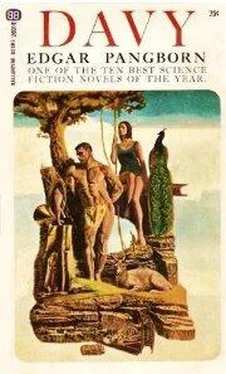We carried with us all designs and working drawings made by our own people. The lower grade workmen had at first only a dim idea of what sort of ship they were engaged in building, but some of them will remember details, and all of them will talk if Salter wants them to. The Holy Murcan Church, up to now, has hogtied itself in this matter, committed to the doctrine that it is morally wrong, offensive to God, to sail out of sight of the land except by what fishermen call the relay system — one vessel holding in sight another which keeps the land within view. Even Dion could not have safely ordered such a ship as the Hawk without explaining to the churchmen that it was needed to overawe the Cod Islands pirates, and would never sail beyond those islands. And the Morning Star , he told them, was needed as a replacement — well — hm-ha — an insurance against a possible regrouping by those Satanic men.
It’s not merely that it would annoy the Almighty to see a man damn-fool enough to fall off the edge of a flat earth; there’s the larger doctrine, that any important kind of curiosity is wrong, a doctrine all religions of the past have been obliged to uphold as the only practical defense against skepticism. Still, theological obstacles are notoriously movable: if the Church knew we were safely ashore out here, a handful of escaped Heretics living in hard work and happiness on islands that could be valuable, I am certain that God’s blessing on a punitive expedition could be almost instantly arranged.
Our military intelligence learned beyond a doubt that ex-pirates from the Cod Islands were scattered through Salter’s army. They don’t know big ships but they know the sea; in the old days before 327, when we had to knock them apart as a nation, their lateen-rigged skimmers may have ventured farther than we suppose. They could handle a large vessel for Salter if he ever managed to build one.
The Cod Islands people-the pirates and their women and slaves and followers — worshiped Satan, the old dark horned god of witchcraft ancient and modern. I’m sure they still do secretly. Likely they considered Old Horny a logical opponent of the existing order of things which they had no reason to love — besides, orgies are fun. The fact that Dion as Regent refused to permit wholesale burning of the Cod Islands people after the pirates’ surrender was one of the most serious grievances the hostile section of the Nuin public, as well as the Church, held against him. The islands were taken over by respectable fishermen’s guilds and added to the province of Hannis; the rank and file of outlaws and exiles and their women and children were allowed to disperse under a general amnesty. Since we hoped to abolish slavery altogether in Nuin and weren’t inclined to set up a mess of new jails, I don’t know what else in logic we could have done. I remember warning Dion that most of the pirates were not going to be grateful more than five minutes, and that the Church wasn’t about to recognize any kind of mercy except its own. He knew that, but went ahead anyhow — and I suppose Niche and I would have given him hell if he had changed his mind as a result of our cautions. Four years later, there the jolly pirates were, in Salter’s army of the rebellion, ready and eager to fight on the Church’s side against the man who had saved them from broiling by that same Church.
Incidentally I think Dion’s insistence on amnesty instead of vengeance was the first occasion in modem times when a secular ruler has held out against Church pressure and got away with it for as long as four years. In the days of Morgan the Great the question didn’t arise. Morgan was all for the Church, which was new then itself as a definite organization; he was an enthusiast, a warrior for God who could be just as happy converting a human brain as smashing it with a broadax, depending I guess on whether it showed any tendency to talk back.
And after a while, the Church may not find itself altogether happy with the Morgan dynasty ended and Erinan Salter President. Salter will cancel the preliminary work we did toward getting rid of slavery; he will destroy our small beginning in the development of secular schools, and there’ll be no more sacrilegious talk of relaxing the prohibitions on Old-Time books and learning. But after those matters are dealt with, the honeymoon between Salter and the Church is likely to peter out. Salter is powerhungry, and that is a disease which grows to a climax of disaster as certainly as a cancer. He respects the Church only for the material strength it derives from its power over men’s minds, not for religious reasons and assuredly not for any temporal good the Church may do — (I as one of its sincerest enemies will admit that it does quite a lot). Salter is a practical man in the saddest sense of that term: a man to whom all art is nonsense, all beauty irrelevant, all charity weakness, all love an illusion to be exploited, and all philosophical questions bushwa. I know these things about him, because the fellow tried to get at Dion through me, quite soon after a humorous chance had swept Niche and me into the presidential orbit and made us important. Salter was quite frank about the quality of his mind while he still believed I had a price. He has no convictions, religious, agnostic, atheist or any other — the religious mask is simply one of many to be worn at convenience. When his kind rules, as it sometimes did in Old Time also — sleep on your knife!
Nay, fair enough — some morning a few years from now we may see on the western ocean the approach of a small clumsy sail…
Yesterday afternoon Dion wandered in out of the rain with Nora Severn and told us he didn’t want to be Governor. We’ve heard this before, and it makes certain kinds of sense, yet most of us hope he can be talked out of his reluctance. We’ve been kicking around a number of political ideas since at our last general assembly five were chosen to write a tentative constitution as it was done in Old Time, looking toward a day when these islands may hold a population large enough to need the larger formalities.
“I’m disqualified,” Dion said, “by the very fact that I did govern in Nuin. Autocrat over maybe a million people — absurd, isn’t it, that any man could be in a position like that? I would try, here, and be afraid all the time of old habits rising inside me. Davy, that day eight years ago — when you and Funny-face were sort of swept into office-I think it’s eight years, isn’t it?—”
“May Day, 323,” said Nickie, and laughed a little.
“Yes. That day, why do you suppose I was so eager to hang on to you after the Festival of Fools was over? Oh, Nickie turning up when I hadn’t seen her for two years and I’d even thought she was dead — of course. The little twirp was always my favorite cousin. But there was something else in it. I’d begun to distrust myself already, though I’d been Regent less than a year…”
I remembered the day. I often do; there’s a brightness in remembering. Nickie and I were twenty, then. We had been living in Old City for two years — obscurely, because Nickie had run away from her family and couldn’t bear the thought of being recognized, knowing the attempts that would be made to draw her back, and how such fuss and uproar would interfere with the work to which she was giving herself body and spirit. Her work was underground, with the Heretics, important and dangerous. Mine, for money-making, was in a furniture factory — Sam Loomis had taught me all he could of joinery when we were with Rumley’s Ramblers — and my other work was to learn, to read the forbidden books under the guidance of Nickie and the Heretics who accepted me because of her, to grow up with a wider understanding of the world I had to live in. She took over, my sweet pepperpot wife, where my substitute mother Mam Laura of the Ramblers had to leave off. Well, but that day, the 29th of April, eve of the Festival of Fools which makes a joyous twenty-four hours of madness for Nuin folk before the gentler delights of May Day — that day Nickie and I were careless. It was the gaiety throughout the city, the reckless delicious urgency of a clear evening of spring, when the sky was piled high with violet-tinted clouds, and there were the street singers, and the flower-girls carried everywhere the scent of lilac.
Читать дальше












